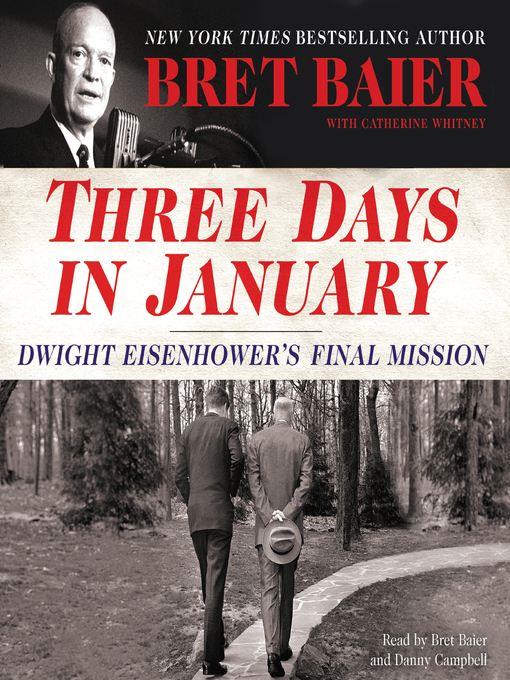
Three Days in January
Dwight Eisenhower's Final Mission
کتاب های مرتبط
- اطلاعات
- نقد و بررسی
- دیدگاه کاربران
نقد و بررسی

Narrator Danny Campbell makes what could have been a dry political science text into a relatively engaging examination of the last days of the Eisenhower administration. Campbell's conversational style carries the listener along, even during some of the more arcane sections. The focus of the work is Ike's efforts to make the transition to the Kennedy administration as smooth as possible. The audiobook also examines at some length the outgoing president's farewell message, which was far more than its memorable warning about the growing military industrial complex. The author opens with a biography of Eisenhower that is detailed enough to provide context but short enough that it doesn't slow the work or detract from its major premise. R.C.G. � AudioFile 2017, Portland, Maine

September 1, 2016
Fox News Channel's chief political anchor uses the three days between Dwight Eisenhower's "farewell address" on January 17, 1961, and John F. Kennedy's inauguration on January 20 as a means of assessing Eisenhower's presidential career. With a 250,000-copy first printing.
Copyright 2016 Library Journal, LLC Used with permission.

February 1, 2017
Using the 34th U.S. President Dwight D. Eisenhower's (1890-1969) farewell address to the nation as a launching point for each chapter, this debut by Baier (Fox News Channel chief political anchor & former White House correspondent), with writer Whitney (The Calling), covers the general-turned-president's life and legacy. Baier offers a nonchronological narrative, combining biography with accounts of Eisenhower's most famous actions and decisions, effectively explaining how this transfer of power demonstrated the evolution of a changing American culture and mind set. Overall, this book tends to be laudatory of Eisenhower but not overly so; Baier provides readers who are unfamiliar with Eisenhower a thorough overview of his life, career, and the transitional period between presidents. While certainly packed with wonderful information, at times the format tends to be choppy and the writing somewhat stilted. Nevertheless, this account is well researched and shines when providing comparisons between Eisenhower and his successor John F. Kennedy. Boasting more than 20 pages of citations, many from primary sources, the appendix is rounded out with a full transcription of Eisenhower's final speech before becoming a private citizen. VERDICT Recommended for readers interested in presidential history; the history of World War II, the Cold War, or U.S. history; and fans of biographies.--Benjamin Brudner, Curry Coll. Lib., Milton, MA
Copyright 2017 Library Journal, LLC Used with permission.

September 1, 2016
Fox News Channel's chief political anchor uses the three days between Dwight Eisenhower's "farewell address" on January 17, 1961, and John F. Kennedy's inauguration on January 20 as a means of assessing Eisenhower's presidential career. With a 250,000-copy first printing.
Copyright 2016 Library Journal, LLC Used with permission.

December 1, 2016
A sobering return to Dwight Eisenhower's farewell address, arriving just before our own moment of uncertain presidential transition.Eisenhower was a paradox: a former supreme commander devoted to peace who managed to keep the country out of war for eight years and left a haunting warning in his final televised speech on Jan. 17, 1961, that the United States had become a "permanent war-based industry." With co-author Whitney, Fox News host Baier (Special Heart: A Journey of Faith, Hope, Courage and Love, 2014, etc.) brings new relevance to Eisenhower's parting message to the young, relatively inexperienced new president, John F. Kennedy. The author explores Eisenhower's last days in office, especially his sense of needing to prepare JFK for the "fate of the civilized world" and brace him against the military-driven mindset. Unlike his relations with his own predecessor, Harry Truman, which were strained and chilly, the World War II hero came around to respecting the glamorous young senator despite their vastly different backgrounds and his inglorious defeat of Richard Nixon. In the 1960 campaign, Kennedy had run on the "missile gap" between the U.S. and Soviet Union--the Soviets had launched the world's first artificial satellite--which Eisenhower knew was "a clever, yet devious, tactic." It was also misleading, since both countries had enough nuclear weapons to leave the world "a moonscape of radioactive ash." This was Eisenhower's message in his parting address, which is included in its entirety in an appendix: that industry had taken over the military; that bright retiring military people had gravitated to aerospace and other related industries; and that massive federal funding outlays were being granted for scientific-military research. As Baier notes, his speech warning of "unwarranted influence...by the military-industrial complex" proved enormously prescient even though it was not widely reported on at the time. Kennedy would learn this lesson quickly in the Bay of Pigs fiasco. A focused and timely study of Eisenhower's significant speech and the sticky transition to JFK's inherited new world.
COPYRIGHT(2016) Kirkus Reviews, ALL RIGHTS RESERVED.

























دیدگاه کاربران